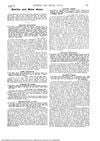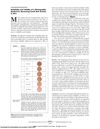 20 citations,
September 2005 in “Clinics in Dermatology”
20 citations,
September 2005 in “Clinics in Dermatology” Some skin problems can be signs of diabetes or other metabolic diseases and recognizing them can help diagnose and treat these diseases early.
 30 citations,
May 2004 in “Journal der Deutschen Dermatologischen Gesellschaft”
30 citations,
May 2004 in “Journal der Deutschen Dermatologischen Gesellschaft” The document concludes that early diagnosis and treatment are crucial for children with hair loss to prevent permanent damage, although not all conditions can be effectively treated.
 15 citations,
May 2007 in “Hormones and Behavior”
15 citations,
May 2007 in “Hormones and Behavior” Finasteride boosts morphine's pain relief, stops tolerance, and reduces withdrawal in rats.
 May 1948 in “Journal of the American Medical Association”
May 1948 in “Journal of the American Medical Association” The reply suggests checking for false positive or asymptomatic syphilis and using penicillin for treatment if necessary.
 4 citations,
November 2011 in “Archives of Dermatology”
4 citations,
November 2011 in “Archives of Dermatology” The photographic method for measuring facial hair density is reliable and valid but needs further testing on different hair densities and skin colors.
 9 citations,
April 2023 in “Journal for Research in Applied Sciences and Biotechnology”
9 citations,
April 2023 in “Journal for Research in Applied Sciences and Biotechnology” Zinc is important for growth and health in animals, plants, and humans, and not having enough can cause various problems.
 November 2017 in “JAMA internal medicine”
November 2017 in “JAMA internal medicine” Women also use 5α-reductase inhibitors, and their effects differ from men.
 4 citations,
February 2022 in “International Journal of Molecular Sciences”
4 citations,
February 2022 in “International Journal of Molecular Sciences” Myotonic Dystrophy may age cells faster, and drugs that target aging could be potential treatments.
 126 citations,
January 1987 in “Journal of The American Academy of Dermatology”
126 citations,
January 1987 in “Journal of The American Academy of Dermatology” The document concludes that understanding hair structure is key to diagnosing hair abnormalities and recommends gentle hair care for management.
August 2017 in “Revista de la Facultad de Ciencias Médicas (Quito)/Revista de la Facultad de Ciencias Médicas” Early baldness in men may indicate a higher risk of prostate cancer.
 26 citations,
November 1993 in “Progress in Neuro-psychopharmacology & Biological Psychiatry”
26 citations,
November 1993 in “Progress in Neuro-psychopharmacology & Biological Psychiatry” Treatment during development affects hormone balance and sexual behavior in male rats.
 229 citations,
August 2002 in “Experimental Gerontology”
229 citations,
August 2002 in “Experimental Gerontology” AGA causes hair loss by shrinking hair follicles due to DHT binding, and can be treated with finasteride and minoxidil.
 73 citations,
May 1976 in “JAMA”
73 citations,
May 1976 in “JAMA” Long-term parenteral nutrition without zinc can cause severe zinc deficiency.
 26 citations,
March 2014 in “Journal of cutaneous medicine and surgery”
26 citations,
March 2014 in “Journal of cutaneous medicine and surgery” Topical vitamin D is useful for some skin conditions but not effective for others, and more research is needed.
 4 citations,
August 2018 in “Clinical Endocrinology”
4 citations,
August 2018 in “Clinical Endocrinology” Women with PCOS have more insulin resistance and are more likely to have heart-related health issues, with insulin resistance being a bigger factor than β-cell problems.
 3 citations,
November 2022 in “Frontiers in oncology”
3 citations,
November 2022 in “Frontiers in oncology” Low zinc levels may be linked to the return of gynecologic cancers.
 1 citations,
July 2023 in “Journal of Clinical Medicine”
1 citations,
July 2023 in “Journal of Clinical Medicine” Different causes of beard hair loss have various treatments, including medications, lifestyle changes, and procedures to stimulate hair growth.
 7 citations,
October 2012 in “S. Karger AG eBooks”
7 citations,
October 2012 in “S. Karger AG eBooks” Some conditions mimic PCOS symptoms and need careful diagnosis to treat potentially serious health issues.
 February 2025 in “Geriatrics and gerontology international/Geriatrics & gerontology international”
February 2025 in “Geriatrics and gerontology international/Geriatrics & gerontology international” Genetic testing is recommended for young patients showing signs like cataracts and hair changes to diagnose Werner syndrome early.
 April 2020 in “Journal of evolution of medical and dental sciences”
April 2020 in “Journal of evolution of medical and dental sciences” A one-year-old child with a genetic condition had symptoms improved by treating zinc deficiency.
 23 citations,
January 1998 in “Urological research”
23 citations,
January 1998 in “Urological research” Castration and finasteride lower urinary oxalate in male rats, potentially treating urolithiasis.
1 citations,
January 2022 in “Springer eBooks”  9 citations,
April 2020 in “Endocrinology, diabetes & metabolism case reports”
9 citations,
April 2020 in “Endocrinology, diabetes & metabolism case reports” Pregnancy with Cushing's syndrome is rare and risky for both mother and baby, needing early diagnosis and treatment.
 1 citations,
August 2002 in “Zeitschrift für Hautkrankheiten”
1 citations,
August 2002 in “Zeitschrift für Hautkrankheiten” Male androgenetic alopecia involves hair follicle miniaturization due to DHT, with potential treatments using inhibitors and blockers.
 107 citations,
August 2002 in “Journal of Neurology, Neurosurgery, and Psychiatry”
107 citations,
August 2002 in “Journal of Neurology, Neurosurgery, and Psychiatry” Women with epilepsy should be monitored for reproductive issues, which can be caused by epilepsy or its treatments, especially when using valproate.
 11 citations,
May 2002 in “The Journal of Urology”
11 citations,
May 2002 in “The Journal of Urology” Finasteride doesn't harm bone density in older men with BPH.
 6 citations,
June 2017 in “Reproductive Biomedicine Online”
6 citations,
June 2017 in “Reproductive Biomedicine Online” Chinese women with PCOS have higher androgen levels, which change with age and weight.
 30 citations,
March 2001 in “Archives of Dermatology”
30 citations,
March 2001 in “Archives of Dermatology” Finasteride can cause one-sided breast enlargement, which disappears after stopping the drug.
 10 citations,
February 2015 in “Clinics in Dermatology”
10 citations,
February 2015 in “Clinics in Dermatology” The document concludes that changes in eyelashes and eyelid skin can indicate various local and systemic diseases.
89 citations,
August 2013 in “PloS one” Androgen receptors are active in many tissues of both male and female mice, not just reproductive organs.



























